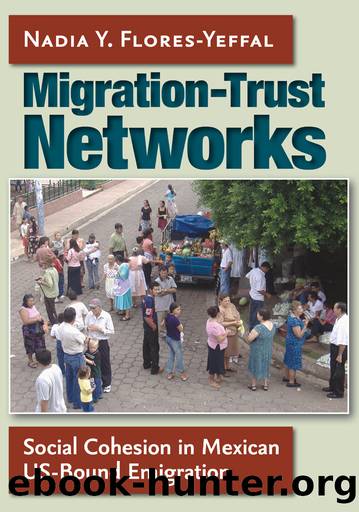Migration-Trust Networks by Flores-Yeffal Nadia Yamel;

Author:Flores-Yeffal, Nadia Yamel;
Language: eng
Format: epub
Publisher: Texas A&M University Press
Published: 2013-08-15T00:00:00+00:00
This chapter explains and provides empirical evidence for a social process in which those international migrants who migrate without being part of an MTN become victims of fragile urban family networks. Urban migrants who are in the United States and left with no social capital seek to diversify their networks by connecting to rural-based or other urban-based MTNs. In most cases, these orphaned urban-based migrants end up absorbed by rural-based MTNs given that rural-origin networks are more likely to be composed of interpersonal connections that perpetuate themselves through relations of solidarity and the enforcement of norms. Once orphan urban migrants identify these MTNs, they can be incorporated into them through a process I call âthe MTN effect.â
As in the story of Martin in chapter 3, where he was taken to Wal-Mart by a stranger who bought him new clothes upon arrival, I found evidence of the following forms of help provided to migrants, which are described in more detail in chapter 3: money for traveling to the Mexican border and surviving until a successful crossing, information about finding a coyote (from a trustworthy source), money to pay the coyote (anywhere from $300 to $2,000 in US dollars), lodging (food and a place to stay), money to buy clothes, transportation, help finding a job, information about buying false documents, enrolling the kids in schools, and where to go to the doctor. As expected, I generally found that rural migrants have less knowledge about urban places of destinations. Therefore, membership to MTNs becomes essential to prospective migrants in order to be able to safely and successfully migrate and settle in the United States. It is very important to state here that urban-origin migrants who were able to obtain tourist visas because of their high levels of human capitalâsuch as higher levels of education, better professional occupations, more economic resources to migrate, and greater access to tourist visasâare still very vulnerable after overstaying their visas. Because these urban-origin migrants have no access to any of the advantages or rights of a legal citizen, they become as vulnerable as any other member of the MTN and are likewise subject to possible exploitation, discrimination, and more importantly, possible deportation. In fact, from the urban-origin interviews, I learned that most of the undocumented urban-origin migrants with higher levels of human capital were not able to transfer their human capital once they arrived to the United States. They were more likely to experience downward mobility rather than obtaining a job that matched their human capital skills (see Flores 2010). Therefore, this particular group could also greatly depend on the support of an MTN for their daily survival at the place of destination. Still, compared to the migrants who arrived from rural areas of origin, who traveled with no legal documents, and who had very low levels of education, those urban dwellers who arrived with a tourist visa and who had higher levels of education were able to learn English more easily, get better jobs, and get ahead.
The MTN Effect
Migration-Trust Networks are mostly composed of close ties and relationships of trust.
Download
This site does not store any files on its server. We only index and link to content provided by other sites. Please contact the content providers to delete copyright contents if any and email us, we'll remove relevant links or contents immediately.
Cecilia; Or, Memoirs of an Heiress — Volume 1 by Fanny Burney(32081)
Cecilia; Or, Memoirs of an Heiress — Volume 3 by Fanny Burney(31471)
Cecilia; Or, Memoirs of an Heiress — Volume 2 by Fanny Burney(31425)
The Great Music City by Andrea Baker(30809)
We're Going to Need More Wine by Gabrielle Union(18649)
All the Missing Girls by Megan Miranda(14810)
Pimp by Iceberg Slim(13809)
Bombshells: Glamour Girls of a Lifetime by Sullivan Steve(13706)
Fifty Shades Freed by E L James(12930)
Talking to Strangers by Malcolm Gladwell(12899)
Norse Mythology by Gaiman Neil(12868)
For the Love of Europe by Rick Steves(11592)
Crazy Rich Asians by Kevin Kwan(8904)
Mindhunter: Inside the FBI's Elite Serial Crime Unit by John E. Douglas & Mark Olshaker(8727)
The Lost Art of Listening by Michael P. Nichols(7178)
Enlightenment Now: The Case for Reason, Science, Humanism, and Progress by Steven Pinker(6885)
The Four Agreements by Don Miguel Ruiz(6330)
Bad Blood by John Carreyrou(6286)
Weapons of Math Destruction by Cathy O'Neil(5855)
